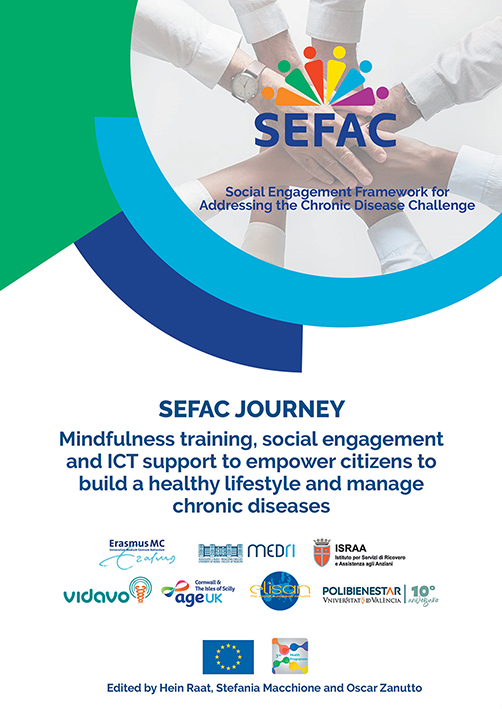SEFAC - Journey Mindfulness training, social engagement and ICT support to empower citizens to build a healthy lifestyle and manage chronic diseases
The Social Engagement Framework for Addressing the Chronic-disease Challenge (SEFAC) project was granted by the EU’s (EU) Third Health Programme (2014-2020) HP-PJ-2016, and supported by the EU Member States, including Croatia, Italy, the Netherlands and United Kingdom (UK), which also involved many stakeholders:
■ Istituto per Servizi di Ricovero e Assistenza Anziani (ISRAA)
■ Sveulciliste U Rijeci, Medicinski Fakultet, University of Rijeka (MEDRI)
■ VIDAVO S.A. (VIDAVO AE) (VIDAVO)
■ Polibienestar Research Institute – University of Valencia (Polibienestar - UVEG)
■ European Local Inclusion and Social Action Network (ELISAN)
■ Age UK Cornwall (Age UK)
■ Erasmus University Medical Center (EMC)
EMC is the coordinating institution. VIDAVO is pioneering an innovative solution for IT support of the care in the project.
The aim of the SEFAC project is to empower citizens ≥ 50 years who are at risk for or with T2DM and CVD, to self-manage their chronic conditions through the SEFAC intervention in the duration of six months. The SEFAC consortium developed the intervention model for health promotion and prevention that consists of workshops, social engagement (professionals and volunteers) with the information and communication technology (ICT) support. The intervention study was designed by a pre- and post-comparison. The results of the evaluation support the hypothesis that SEFAC can contribute to improve indicators of ‘self-efficacy’ among the participants; and that SEFAC can contribute to a favorable change regarding ‘sedentary behaviours’, ‘social support’, ‘mental well-being’, and ‘healthrelated quality of life’. Therefore, I expect that the SEFAC intervention can contribute to the reduction of the burden of major chronic diseases and can help to increase the sustainability of health systems.
Download the Book



